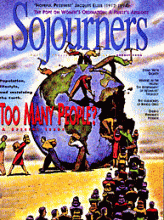The Red Road was believed to be the path through this world leading to the Higher Power.
—Bill Miller
It has been said that one of the greatest injustices done to Native Americans today is the attempt to keep them living in the past. White America is alternately fascinated by historical Native American culture and ignorant of, or apathetic toward, contemporary Native American struggles. We’ll stand in line to see Kevin Costner in Dances With Wolves (with a white man playing soldiers and Indians), but few will ever walk down the reservation road Bill Miller invites us to in his most recent release, The Red Road.
This is a story about a journey. It’s about trails and paths. At times it’s about drifting aimlessly; more often it’s about soaring with eagles and hawks. Through it all, Miller, who was raised on the Stockbridge-Munsee Indian reservation in central Wisconsin, never fails to praise God, to honor his Mohican heritage, or, with quiet forcefulness, to hold white America accountable for its actions.
Miller opens his first recording on a major label with "Dreams of Wounded Knee," a stirring requiem that masterfully blends guitar and flute to call forth mourning and wailing. This is followed by "Praises," a spiritual that transcends time and place through a combination of Menominee chants and English lyrics. Joined by the Smokey Town Singers, a group of Pow Wow performers based on the Menominee Indian Reservation in Shawano, Wisconsin, "Praises" opens and closes with "Ma-Nee-Ta-haem" (We feel good in our hearts)/"Wa-Wa-Non" (We thank you)/"Mau-Ne-Ka-Ko-Saw-te-wa" (We have everything) /"Mah-Maw-Koh-Ne-No" (Our father up above), while Miller praises the Creator for all of creation: rivers, mountains, eagles, his children, and his people.
Read the Full Article
